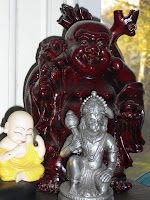
Yesterday, at our all-day practice period, I gave a talk about Case 38 in the Gateless Gate koan collection, and had an unfounded but strong feeling it would be the best talk I've given in a very long time, so I decided to record it using the beautiful digital recorder that a student gave me as a gift a couple of years ago. It turned out to be a pretty good talk, as these things go, and the dharma dialogue that followed was truly wonderful. A number of practitioners thanked me for it later, saying that it was very meaningful for them.
And so I was excited about posting it here, and on our Boundless Way website, and sat down just now to upload it to my computer, the first step to dispersing it to the world. I discovered, alas, with some embarrassment and a little bit of amusement, that the talk does not exist anywhere on the recorder. It turns out that I still haven't mastered the mysteries of this tiny, complex machine. I put my nose to the grindstone and devoted myself to reading the thick instruction manual, and I am proud to say that I not only learned how to record talks, but also how to delete them -- at least I believe that this is so. My new knowledge will be a great benefit to all beings in the future, I'm sure.
While the talk no longer exists in aural form, there are still a few thought waves kicking around in my head, and perhaps in the heads of those who heard it. So in the spirit of beginner's mind, here is the case, in Robert Aitken's translation, with a few comments from the me who exists in this moment, rather than the me who gave the talk yesterday.
The Case: Wuzu said, "It is like a buffalo that passes through a latticed window. Its head, horns, and four legs all pass through. Why can't its tail pass through as well?"
Wumen's Verse: Passing through, falling into a ditch: turning beyond, all is lost. This tiny little tail -- what a wonderful thing it is!
And I will simply add: Not understanding how to operate a recorder! What a wonderful thing it is!



